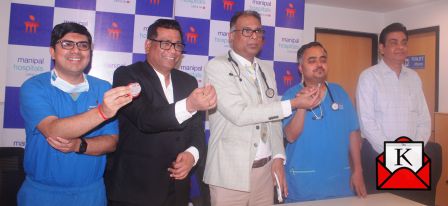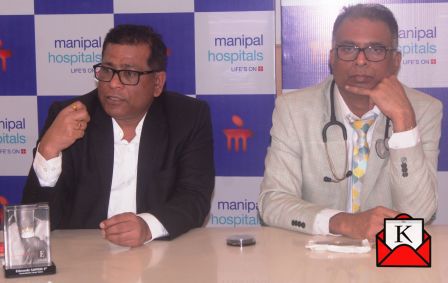AI-Powered Injectable Wireless Pacemaker Now In East India


An AI-driven, wireless injectable pacemaker was successfully inserted at Manipal Hospitals, one of India’s biggest hospital networks, marking a revolutionary advancement in cardiac treatment. Abbott created the Aveir Leadless pacemaker, which just days ago made its debut in India. Interestingly, Manipal Hospitals in Dhakuria is now the first facility in Eastern India to carry out the operation. A 65-year-old patient just had this life-saving device placed in their heart, becoming the first person in this area to receive the cutting-edge pacemaker. The novel pacemaker, which is already in use in the US and Europe, offers Indian patients a less intrusive and safer option than conventional pacemakers for the treatment of cardiac rhythm abnormalities.
The event was attended by eminent cardiologists from Manipal Hospitals, like Dr. P.K. Hazra, Interventional Cardiologist, Manipal Hospitals, Dhakuria, Dr. Sumanta Chatterjee, Consultant Cardiologist, Manipal Hospitals, Dhakuria, Dr. Soumya Kanti Dutta, Consultant Interventional Cardiologist, Manipal Hospitals, Dhakuria, and Dr. Dilip Kumar, Director of the Cardiac Cath Lab & Senior Consultant Interventional Cardiologist & Electrophysiologist, Medica Superspecialty Hospital (An unit of Manipal Hospitals).
According to these specialists, wireless pacemakers may be a better choice for many people, as seen by the rising number of pacemaker insertion procedures performed in India. The occasion was also attended by Mr. Rajesh Pareekh, Unit Head of Manipal Hospitals Dhakuria, who emphasized the hospital’s dedication to offering state-of-the-art medical solutions.
The 2.4-gram Aveir Leadless pacemaker stays firmly in place inside the heart thanks to nanotechnology. Pacemaker replacement is less likely because the device lasts 20–25 years, which is nearly three times longer than the average pacemaker’s lifespan of 7-8 years. Additionally, because of its non-magnetic construction, it is impervious to MRI scanners, airport scanners, and high-voltage electrical currents, guaranteeing that the patient’s daily functioning is not jeopardized.
The pacemaker has a special benefit despite not being rechargeable. It can be upgraded from a single chamber to a twin chamber arrangement, providing patients with a flexible and long-lasting option. It is capable of effectively separating and controlling the heart’s right atrium and right ventricle. In addition to removing the need for external wires and invasive surgery, this pacemaker has Bluetooth-enabled technology that enables remote monitoring and changes. Regular hospital visits are no longer necessary because specialists from around the globe can now monitor their patients.
The use of wireless pacemakers is increasingly becoming widely accepted. Wireless pacemakers have been around for a while, but the earlier types were unable to pace the ventricles and the atrium. Because it drastically lowers the risks of complications like hematoma development, infections, lead dislodgement, and other lead-related problems, this breakthrough thrills the doctors. It provides patients and physicians with unmatched comfort.
Patients who were previously thought to be unsuitable for traditional pacemaker implantation now have more options because of this pacemaker. To implant a device and wires (leads) into the chest, traditional pacemakers require invasive surgery, which sometimes results in issues including infections. Instead of using surgical pockets and external wires, which are the main sources of patient infections, the injectable wireless pacemaker is injected straight into the right ventricle of the heart. This device is ideal for patients on blood thinners, dialysis patients, and people with weakened immune systems or skin disorders. Because it is minimally invasive, the gadget is also perfect for older patients or young ladies who are worried about scars.
India has shown interest in enhancing cardiac healthcare in the nation by becoming the third nation in the world to adopt injectable pacemakers approved by the US FDA and the European Medical Authority. Notably, only qualified experts who have undergone the necessary training and certification can do the surgery, guaranteeing high-quality care. With the launch of this new wireless pacemaker in India, patients now have a long-term option that can enhance their quality of life and ensure better cardiac care.
Priyanka Dutta
